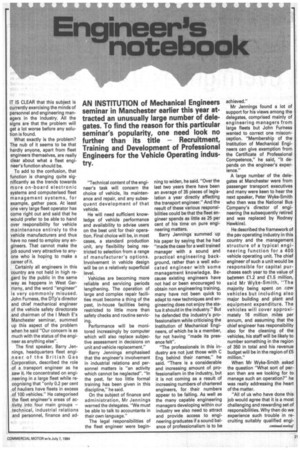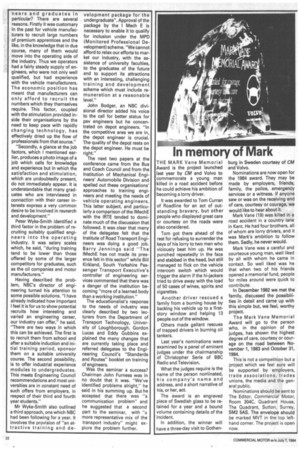IT IS CLEAR that this subject is currently exercising the
Page 23

Page 24

If you've noticed an error in this article please click here to report it so we can fix it.
minds of personnel and engineering managers in the industry. All the signs are that the problem will get a lot worse before any solution is found.
What exactly is the problem? The nub of it seems to be that hardly anyone, apart from fleet engineers themselves, are really clear about what a fleet engineer's function should be.
To add to the confusion, that function is changing quite significantly as the trends towards more on-board electronic systems and computerised fleet management systems, for example, gather pace. At least one very large fleet operator has come right out and said that he would prefer to be able to hand over responsibility for vehicle maintenance entirely to the vehicle manufacturers and thus have no need to employ any engineers. That cannot make the job sound very attractive to anyone who is hoping to make a career of it.
Certainly all engineers in this country are not held in high regard by the public in the same way as happens in West Germany, and the word "engineer" is very commonly misused. John Furness, the DTp's director and chief mechanical engineer of the vehicle safety directorate and chairman of the I Mech E's Manchester seminar, summed up this aspect of the problem when he said "Our concern is as much with the status of the engineer as anything else".
The first speaker, Barry Jennings, headquarters fleet engineer of the British Gas Corporation, described the role of a transport engineer as he saw it. He concentrated on engineering in a large fleet while recognising that "only 0.2 per cent of hauliers have fleets in excess of 100 vehicles." He categorised the fleet engineer's areas of activity into four main groups — technical, industrial relations and personnel, finance and ad "Technical content of the engineer's task will concern the choice of vehicle, its maintenance and repair, and any subsequent development of that vehicle.
He will need sufficient knowledge of vehicle performance and availability to advise users on the best unit for their operation. Final choice will be, in most cases, a standard production unit, any flexibility being restricted to selection from a range of manufacturer's options. Involvement in vehicle design will be on a relatively superficial level.
Vehicles are becoming more reliable and servicing periods lengthening. The operation of large and complex repair facilities must become a thing of the past, in-house facilities being restricted to little more than safety checks and routine servicing.
Performance will be monitored increasingly by computer which will also replace subjective assessment in decisions on unit and vehicle replacement."
Barry Jennings emphasised that the engineer's involvement in industrial relations and personnel matters is "an activity which cannot be neglected". "In the past, far too little formal training has been given in this discipline," he said.
On the subject of finance and administration, Mr Jennings warned the delegates. "We must be able to talk to accountants in their own language."
The legal responsibilities of the fleet engineer were begin ning to widen, he said. "Over the last two years there have been an average of 35 pieces of legislation a year directly affecting the transport engineer." And the result of these various responsibilities could be that the fleet engineer spends as little as 25 per cent of his time on pure engineering matters.
Barry Jennings summed up his paper by saying that he had "made the case for a well trained manager with a sound and practical engineering background, rather than a well educated engineer with some management knowledge. Because existing engineers have not had or been encouraged to obtain non engineering training, many have not been quick to adapt to new techniques and engineering does not enjoy the status it should in the industry." But he defended the industry's professionalism while criticising the Institution of Mechanical Engineers, of which he is a member, for not having "made its presence felt".
"The professionals in this industry are not just those with C Eng behind their names," he said. "There is a considerable and increasing amount of professionalism in the industry, but it is not coming as a result of increasing numbers of chartered engineers, for their numbers appear to be falling. As well as the many capable engineering managers developing within our industry we also need to attract and provide access to engineering graduates if a sound balance of professionalism is to be achieved."
Mr Jennings found a lot of support for his views among the delegates, comprised mainly of engineering managers from large fleets but John Furness wanted to correct one misconception. "Membership of the Institution of Mechanical Engineers can give exemption from the Certificate of Professional Competence," he said, "it depends on the engineer's experience."
A large number of the delegates at Manchester were from passenger transport executives and many were keen to hear the next speaker, Peter Wyke-Smith who then was the National Bus Company's director of engineering (he subsequently retired and was replaced by Rodney Hawkins).
He described the framework of the psv operating industry in this country and the management structure of a typical engineering function for a 400 vehicle operating unit. The chief engineer of such a unit would be responsible for capital purchases each year to the value of between £1.2 and £1.5 million, said Mr Wyke-Smith, "The majority being spent on flew vehicles but including also major building and plant and equipment expenditure. The vehicles will cover approximately 16 million miles per annum, and assuming that the chief engineer has responsibility also for the cleaning of the vehicles, his staff will be likely to number something in the region of 350 in total and his revenue budget will be in the region of £5 million."
When Mr Wyke-Smith asked the question "What sort of person then are we looking for to manage such an operation?" he was really addressing the heart of the matter.
"All of us who have done this job would agree that it is a most challenging and rewarding set of responsibilities. Why then do we experience such trouble in recruiting suitably qualified engi neers and graduates in particular? There are several reasons. Firstly it was customary in the past for vehicle manufacturers to recruit large numbers of premium apprentices and the like, in the knowledge that in due course, many of them would move into the operating side of the industry. Thus we operators had a fairly steady supply of engineers, who were not only well qualified, but had experience with the vehicle manufacturers. The economic position has meant that manufacturers can only afford to recruit the numbers which they themselves require. This factor, coupled with the stimulation provided inside their organisations by the need to keep pace with rapidly changing technology, has effectively dried up the flow of professionals from that source."
"Secondly, a glance at the job factors, which I mentioned earlier, produces a photo image of a job which calls for knowledge and experience but in which the satisfaction and stimulation, which are undoubtedly present, do not immediately appear. It is understandable that many graduates who are interviewed in connection with their career interests express a very common desire to be involved in research and development."
Peter Wyke-Smith identified a third factor in the problem of recruiting suitably qualified engineers into the operating industry. It was salary scales which, he said, "during training tend to be lower than those offered by some of the larger competitors for graduates, such as the oil companies and motor manufacturers."
Having described the problem, NBC's director of engineering turned his attention to some possible solutions. "I have already indicated how important I feel it is for us to show potential recruits how interesting and varied an engineering career, our industry can offer," he said. "There are two ways in which this can be achieved. The first is to recruit them from school and after a suitable induction and initial training period, sponsor them on a suitable university course. The second possibility, is to offer industrial experience modules to undergraduates. This meets Engineering Council recommendations and most universities are in constant need of such offers from employers, in respect of their third and fourth year students."
Mr Wyke-Smith also outlined a third approach, one which NBC had been following for a year. It involves the provision of "an attractive training and de velopment package for the undergraduate". Approval of the package by the I Mech E is necessary to enable it to qualify for inclusion under the MPD (Monitored Professional Development) scheme. "We cannot afford to relax our efforts to market our industry, with the assistance of university faculties, to the graduates of the future and to support its attractions with an interesting, challenging training and development scheme which must include remuneration at a reasonable level."
John Bodger, an NBC divisional director added his voice to the call for better status for psv engineers but he concentrated on depot engineers. "In the competitive area we are in, the depot engineer is crucial. The quality of the depot rests on the depot engineer. He must be right."
The next two papers at the conference came from the Bus and Coach Council and from the Institution of Mechanical Engineers' Automobile Division and spelled out these organisations' approaches to training engineers and meeting the needs of vehicle operating engineers. This latter subject, and particularly a comparison of the IMechE with the IRTE tended to dominate much of the discussion that followed. It was clear that many of the delegates felt that the Institute of Road Transport Engineers was doing a good job. Barry Jennings said "The IMechE has not made its presence felt in this sector" while Bill Kirkland, South Yorkshire Passenger Transport Executive's controller of engineering services commented that there was a danger of the institution becoming "more of a learned body than a working institution."
The educationalist's response to the needs of industry was clearly described by two lecturers from the Department of Transport Technology, University of Loughborough. Gordon Lucas and Eddy Gubbins explained the many changes that are currently taking place and referred delegates to the Engineering Council's "Standards and Routes" booklet on training of engineers.
Was the seminar a success? Chairman John Furness was in no doubt that it was. "We've identified problems alright," he said in his summing up. But he accepted that there was "a communication problem" and he suggested that a second part to the seminar, with "a more representative mix of the transport industry" might explore the problem further.




























































































